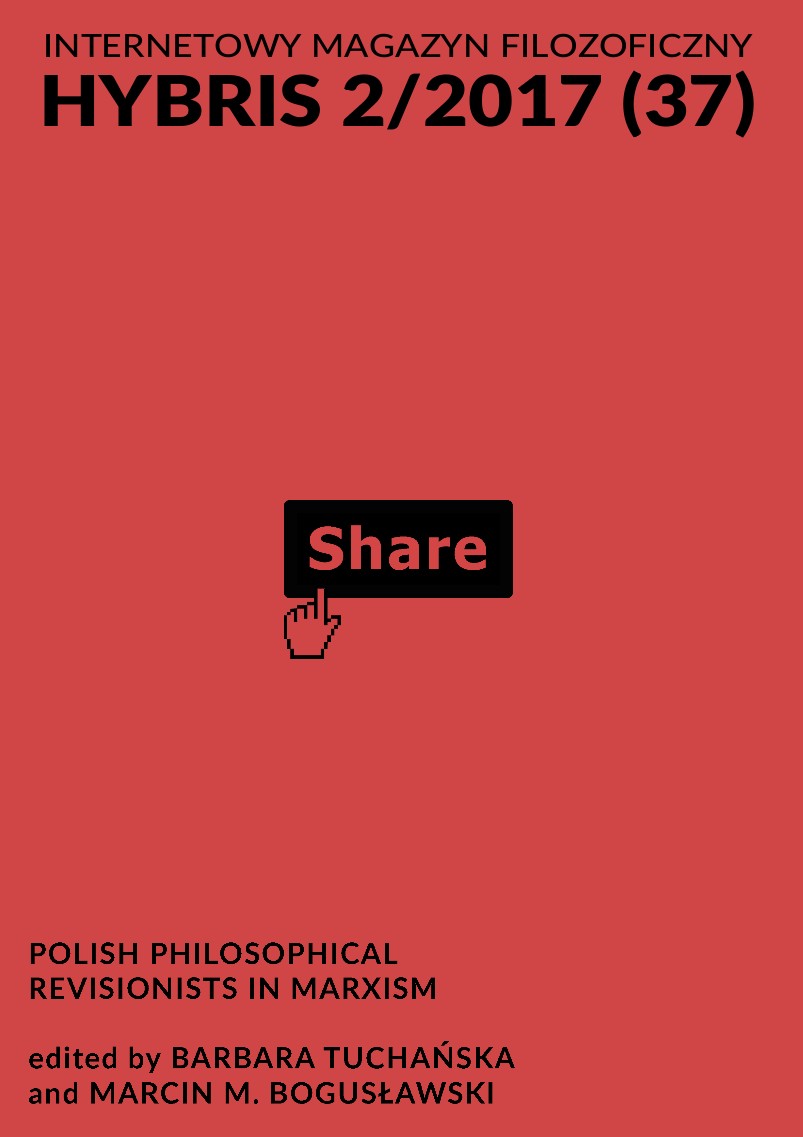Marxist trait of revisionism: Leszek Kołakowski’s consistent transition to inconsistent philosophy
DOI:
https://doi.org/10.18778/1689-4286.37.03Keywords:
Kołakowski, revisionism, Marxism, involvementAbstract
In the article the author describes theoretical reasons that stood behind Kołakowski's transition from being an orthodox Marxist to become an actual leader of the polish revisionist movement. His intention is to concentrate on those aspects of Kołakowski's thought that have not changed, apart from any biographical and psychological reasons. (1) First of those features is Kołakowski's inability of completability, the anti-code disposition. (2) The second trait is the moral attitude, an intention to influence on people's morality by convincing them that social and internal (necessarily bound with social) changes are desirable; that an existential calm demolishes morality. (3) Third feature concerns the fact that Kołakowski did not attempt to create his own philosophy, he was rather a historian of ideas, a skeptic, and a critic.
References
Baczko, B., Kołakowski, L. (1954). Tradycje naukowego socjalizmu i zadania marksistowskiej historiografii filozoficznej. Myśl Filozoficzna, 4, 78-103.
View in Google Scholar
Chudy, W. (1990). Filozofia polska po II wojnie światowej. (Szkic). Studia Philosophiae Christianae, 26/1, 129-141.
View in Google Scholar
Ciepielak, M. (2016). Radomski PiS powalczył z prof. Leszkiem Kołakowskim. Wyborcza.pl, http://wyborcza.pl/1,75398,19945633,radomski-pis-powalczyl-z-prof-leszkiem-kolakowskim.html#ixzz4VHqn3TC2 (online: 30.12.2016).
View in Google Scholar
Karpiński, W., Kołakowski, L. (2012). Rozmowa pamiętna. In L. Kołakowski, Mądrość prawdziwa, „Zeszyty literackie”, nr specjalny 1.
View in Google Scholar
Kline, G. L. (1971). Selective bibliography. TriQuarterly. 22, 239-250.
View in Google Scholar
DOI: https://doi.org/10.1016/S0009-9260(71)80065-X
Kłoczowski, J. A. (1994). Więcej niż mit. Leszka Kołakowskiego spory o religię. Kraków: Wydawnictwo Znak.
View in Google Scholar
Kołakowski, L. (1947). Impresje dialektyczne. Po prostu, 4, 8 and 11.
View in Google Scholar
Kołakowski, L. (1949a). Manowce szlachetnych dążeń. Kuźnica, 35, 7.
View in Google Scholar
Kołakowski, L. (1949b). Rewolucja zdrowego rozsądku. Kuźnica, 13, 4-5.
View in Google Scholar
Kołakowski, L. (1950). Kilka uwag w sprawie „Przeglądu Filozoficznego”. Nowe Drogi, 2, 288-299.
View in Google Scholar
Kołakowski, L. (1955a). Neotomizm w walce z nauką i prawami człowieka. In L. Kołakowski, Szkice o filozofii katolickiej (7-34). Warszawa: Państwowe Wydawnictwo Naukowe.
View in Google Scholar
Kołakowski, L. (1955b). „Prawa osoby” przeciwko prawom człowieka. In L. Kołakowski, Szkice o filozofii katolickiej (146-213). Warszawa: Państwowe Wydawnictwo Naukowe.
View in Google Scholar
Kołakowski, L. (1955c). Szkice o filozofii katolickiej. Warszawa: Państwowe Wydawnictwo Naukowe.
View in Google Scholar
Kołakowski, L. (1957a). Międzynarodowe Spotkanie Filozoficzne w Warszawie. Studia Filozoficzne, 2, 219-225.
View in Google Scholar
Kołakowski, L. (1957b). Światopogląd i edukacja. In L. Kołakowski, Światopogląd i życie codzienne (29-52). Warszawa: Państwowy Instytut Wydawniczy.
View in Google Scholar
Kołakowski, L. (1957c). Światopogląd i życie codzienne. Warszawa: Państwowy Instytut Wydawniczy.
View in Google Scholar
Kołakowski, L. (1957d). Z czego żyją filozofowie. In L. Kołakowski, Światopogląd i życie codzienne (7-28). Warszawa: Państwowy Instytut Wydawniczy.
View in Google Scholar
Kołakowski, L. (1964). In Praise of Inconsistency. Dissent, 11 (2), 201–209.
View in Google Scholar
Kołakowski, L. (1968a). Intellectuals and the Communist Movement, translated by Jane Zielonko Peel. In L. Kołakowski, Toward a Marxist Humanism. Essays on the Left Today (158-172). New York: Grove Press, Inc.
View in Google Scholar
Kołakowski, L. (1968b). Permanent vs. Transitory Aspects of Marxism, translated by Jane Zielonko Peel. In L. Kołakowski, Toward a Marxist Humanism. Essays on the Left Today (173-187). New York: Grove Press, Inc.
View in Google Scholar
Kołakowski, L. (1968c). Responsibility and History, translated by Jane Zielonko Peel. In L. Kołakowski, Toward a Marxist Humanism. Essays on the Left Today (85-157). New York: Grove Press, Inc.
View in Google Scholar
Kołakowski, L. (1968d). The Concept on the Left, translated by Jane Zielonko Peel. In L. Kołakowski, Toward a Marxist Humanism. Essays on the Left Today (67-83). New York: Grove Press, Inc.
View in Google Scholar
Kołakowski, L. (1968e). The Priest and the Jester, translated by Jane Zielonko Peel. In L. Kołakowski, Toward a Marxist Humanism. Essays on the Left Today (9-37). New York: Grove Press, Inc.
View in Google Scholar
Kołakowski, L. (1971). Ethics without a moral code, translated by Alan Ross. TriQuarterly. 22, 154-182.
View in Google Scholar
Kołakowski, L. (1975). Neutrality and academic values. In A. Montefiore (ed.), Neutrality and Impartiality The University and Political Commitment (72-85). Cambridge: Cambridge Univeristy Press.
View in Google Scholar
Kołakowski, L. (1978). Main Currents of Marxism: Its Origins, Growth and Dissolution. Volume III. The Breakdown, translated by Paul Stephen Falla. Oxford: Clarendon Press.
View in Google Scholar
Kołakowski, L. (1982). Religion: If There is No God... On God, the Devil, Sin and Other Worries of the So-Called Philosophy of Religion. Glasgow: Fontana Paperbacks.
View in Google Scholar
Kołakowski, L. (1984). Słowo wstępne. In L. Kołakowski, Czy diabeł może być zbawiony i 27 innych kazań (7-8). Londyn: Aneks.
View in Google Scholar
Kołakowski, L. (1986). Le village introuvable, translated by Jacques Dewitte. In L. Kołakowski, Le village introuvable (7-21). Bruxelles: Editions Complexe.
View in Google Scholar
Kołakowski, L. (1988). Metaphysical Horror, Oxford: Basil Blackwell Ltd.
View in Google Scholar
Kołakowski, L. (1989). The Presence of Myth, translated by Adam Czerniawski. Chicago und London: The University of Chicago Press.
View in Google Scholar
DOI: https://doi.org/10.7208/chicago/9780226222257.001.0001
Kołakowski, L. (1990). Education to Hatred. Education to Dignity. In L. Kołakowski, Modernity on Endless Trial (255-261). Chicago und London: The University of Chicago Press.
View in Google Scholar
Kołakowski, L. (2002). Posłowie. In L. Kołakowski, Pochwała niekonsekwencji. Tom III (311-316). Londyn: Wydawnictwo Puls.
View in Google Scholar
Kołakowski, L. (2007). Czas ciekawy, czas niespokojny. Kraków: Wydawnictwo Znak.
View in Google Scholar
Skarga, B. (2002). Sceptycyzm metafizyką podszyty. Tygodnik Powszechny. Apokryf, 18, http://www.tygodnik.com.pl/apokryf/18/skarga.html (online: 30.12.2016).
View in Google Scholar
Tokarski, J. (2016). Obecność zła. O filozofii Leszka Kołakowskiego. Kraków: Universitas.
View in Google Scholar
Walicki, A. (1984). On writing Intellectual History: Leszek Kolakowski and the Warsaw School of the History of Ideas. Critical Philosophy (Sydney), 1 (2), 5-23.
View in Google Scholar
Downloads
Published
How to Cite
Issue
Section
License

This work is licensed under a Creative Commons Attribution-NonCommercial-NoDerivatives 4.0 International License.






